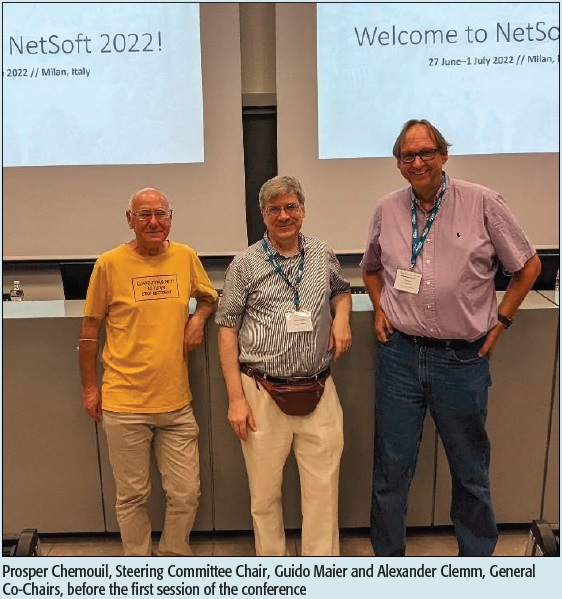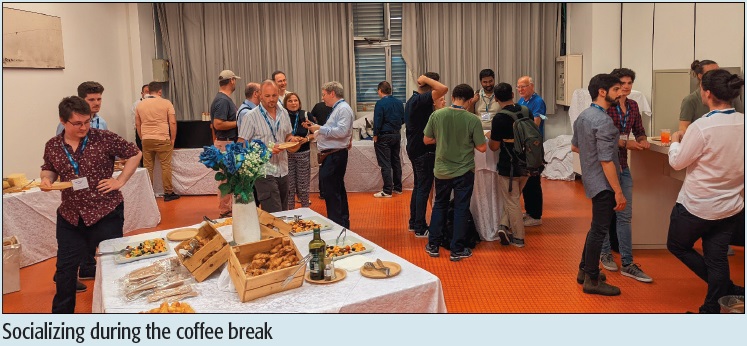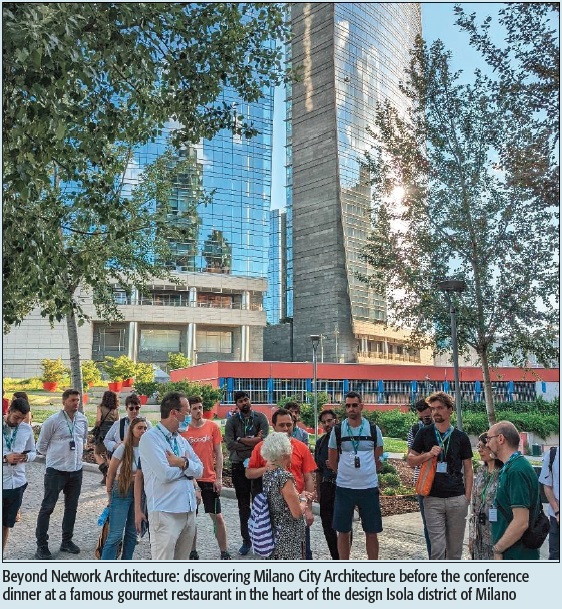
The 8th IEEE International Conference on Network Softwarization (IEEE NetSoft 2022) was held from June 27 to July 1, 2022 in Milan, Italy, one of the most vibrant cities in Europe. The conference was hosted by Politecnico di Milano in its historical downtown campus, during a week of beautiful (and very toasty) weather and against the backdrop of a vibrant University full of student life with courses in full swing.
The theme of IEEE NetSoft 2022 was “Network Softwarization Coming of Age: New Challenges and Opportunities”. The theme acknowledges the fact that network softwarization has reached a certain level of maturity since the first incarnation of the conference almost a decade ago. At this point, network softwarization is part of the technical mainstream and there a substantive body of experience with large-scale commercial deployments that have left the experimental stages at the lab. This provides a solid foundation from which to stage the exploration of new frontiers to push the limits of network softwarization even further, including but not limited to challenges regarding security, safety, trust and privacy in virtualized environments; advances in network programming methodologies, architectures, and languages; AI techniques to support network automation; or multi-tenant SDN/NFV.
Given the general improvement of the COVID-19 pandemic situation around the world in general and in Europe and Italy in particular, NetSoft 2022 was organized as an in-person event to provide opportunities to network and renew friendships as well as create new ones in ways that previous (virtual) conference editions could not. For this reason, NetSoft 2022 featured an extensive social program to complement the technical part of the program, including welcome reception, conference banquet, and campus and city tours. Unfortunately, the pandemic is not over and not everybody was able to travel, hence IEEE NetSoft 2022 also welcomed and accommodated participation and presentations from remote authors. All in all, 130 researchers turned out in person and were joined by another 80 colleagues from remote.
The core of the conference ran from Tuesday to Thursday. It featured a lineup of 21 long papers selected from the open submission process, organized into six Technical Sessions with the topics of Deployment and Operations, 5G and URLLC, RAN and Optimization, Intelligence and Control, Resilience, and Security. These were complemented by two short-paper sessions (selected from submissions explicitly submitted as short papers, not relegated long papers) and two demo sessions that showcased prototypes and proof-of-concept implementations of ongoing research. The acceptance rate was 24.9%.
The technical program was anchored by a range of inspiring keynote talks delivered by world-class researchers and practitioners. Walter Cerroni from the University of Bologna (Italy), had the honor of kicking things off, giving a retrospective look at how far Network Softwarization has come. His talk was followed by Nate Foster from Cornell University (USA) who discussed foundational challenges and opportunities regarding the implementation and deployment of networks whose behavior is verifiably correct. A crucial aspect of this concerns tool chains implementing provably correct transformation rules along every step of the way. Francesc Guim from Intel (Spain) reflected on the topic of smart edge architectures, drawing particular attention to the increasingly important issue of sustainability and the need of networks to be very efficient in their energy usage. Kurt Tutschku from Blekinge Institute of Technology (Sweden) presented on the idea of using Blockchain-based marketplaces for network services. Sujata Banerjee from VMware Research (USA) and Dario Rossi from Huawei (France) rounded out the keynote lineup with discussions of data-driving networking as part of edge-to-cloud infrastructure, and of AI-native networking respectively.

The keynotes were complemented by the Distinguished Expert Panel in which the theme of the conference (Network Softwarization Coming of Age: New Challenges and Opportunities) was discussed by a lineup of experts representing vastly different perspectives. Russ White from Juniper (USA) and Filip De Turck from the University of Ghent (Belgium) co-moderated the panel. Jeff Tantsura (Microsoft, USA) and Paolo Crosta (Italtel, Italy) provided a decisively industrial viewpoint, focusing on market forces, commercial opportunities and the state of actual network deployments, whereas Barbara Martini (Universitas Mercatorum, Italy) and Diogo Menezes Ferrazani Mattos (Universidade Federal Fluminense, Brazil) took a more academic perspective.
Monday and Friday focused workshops and tutorials to provide the opportunity to dive deeper into selected specialized topics. Tutorials covered dataplane programming (covering the use of P4 on a testbed with Raspberry Pis in one tutorial, and the use enhanced Berkeley Packet Filters to program packet actions and behavior in the other), O-RAN, and network availability. The workshop topics included intent-based networking (WIN), cyber-security and privacy in software-defined infrastructures (SecSoft), network energy efficiency (GreenNet), performance evaluation of SDN and virtualized networks (PVE-SDN), and edge network softwarization (ENS).
IEEE NetSoft 2022 would not have been possible without the support of its dedicated Organizing Committee members, the TPC members, the countless reviewers of papers, the authors who submitted papers, and most of all of course the participants without whom there would not have been such a lively and memorable event. A bit shout-out needs to be given to the local organization team who made sure everything ran smoothly, quite a challenge for what was in effect a hybrid event. IEEE NetSoft also received generous financial support from its patrons, Intel, Huawei, Italtel, Eolo, and Tiesse, which was crucial to absorb the financial risks at a time when it was not clear how large the physical turnout was actually going to be. Lastly, the support of our hosts, Politecnico di Milano, is gratefully acknowledged.
While all good things have to come to an end, we are already looking forward to next year’s IEEE NetSoft, to be held in Madrid, Spain from June 26–30, 2023. We are sure it will be another great one and we would like to encourage researchers in the area of network softwarization to plan on submitting a paper around the beginning of the year; please refer to the upcoming Website for detailed announcements.
